Learn about brain health and nootropics to boost brain function
Best Ginkgo Biloba
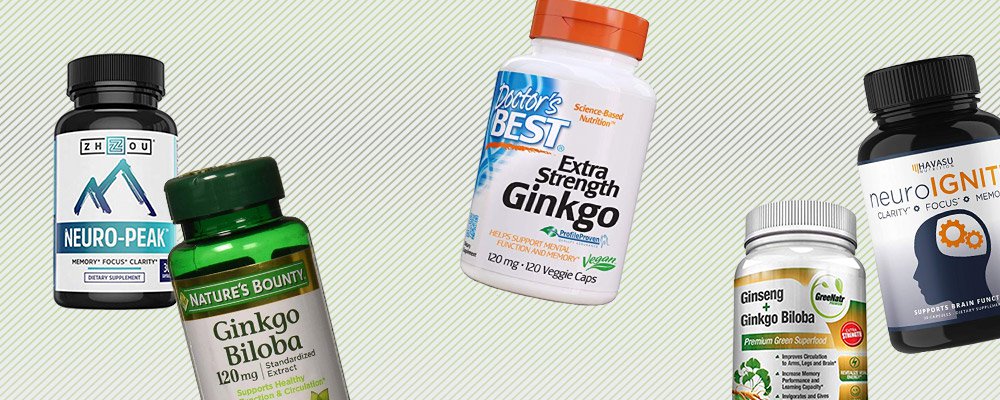
The leaves and seeds of the Ginkgo Biloba tree have been used in traditional Chinese medicine for centuries. Today, the extract taken from ginkgo biloba leaves is a very common herbal supplement. Though claims of ginkgo biloba’s ability to treat a wide number of ailments have been wildly exaggerated, there is evidence that it may have some antioxidant and anti-inflammatory properties (1) (2). Additionally, there is some proof that ginkgo can increase blood flow (3). Though there’s some hope that it may prevent memory decline or improve brain health, there is no strong evidence to support that claim (4) (5).
There are a lot of rather outlandish claims associated with ginkgo biloba supplements. Some products will claim it can improve memory, improve mood, and even treat anxiety symptoms. While we do have some evidence that ginkgo biloba’s antioxidative and anti-inflammatory qualities exist, much more research is needed to ascertain their efficacy in treating a wide variety of ailments. If you decide to try ginkgo biloba, however, there are a ton of options on the market. It’s important to know how to distinguish between the various choices.
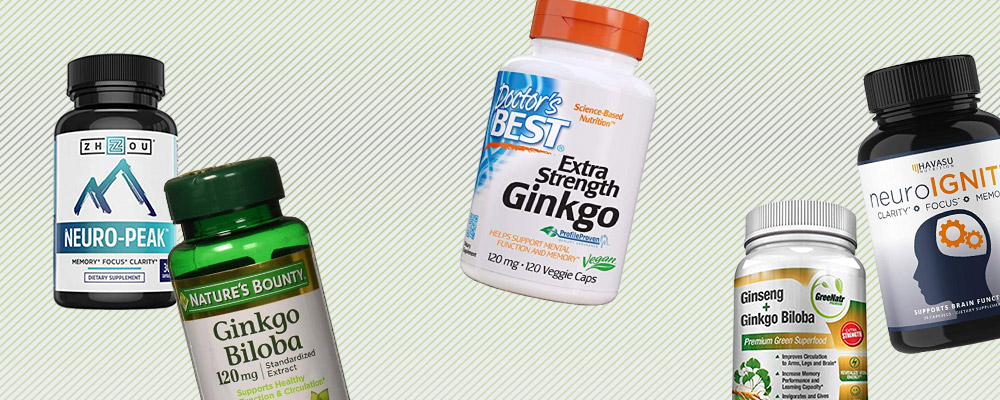
Editors’ Choice:
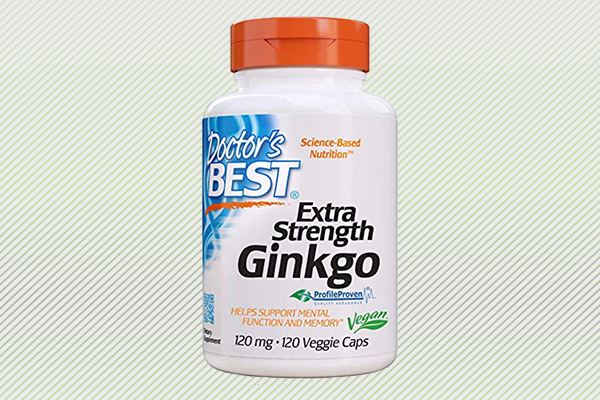
Pros:
- Each Doctor’s Best veggie cap contains 120mg of ginkgo biloba.
- These caps are non-GMO and vegan-friendly, as well as being gluten and soy free.
- The manufacturer notes that each batch is 3rd party tested.
- On a per serving basis, Doctor’s Best ginkgo biloba veggie caps are very reasonably priced.
Cons:
- Though these caps are very straightforward, some may prefer to check out options that combine ginkgo biloba with other ingredients intended to promote brain health.
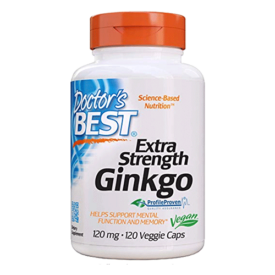
Checking in with a very competitively priced offering, Doctor’s Best Extra Strength Ginkgo is a very straightforward supplement. With 120mg of ginkgo biloba per serving, these vegan caps provide a solid dosing of ginkgo at a reasonable price.
Contender:
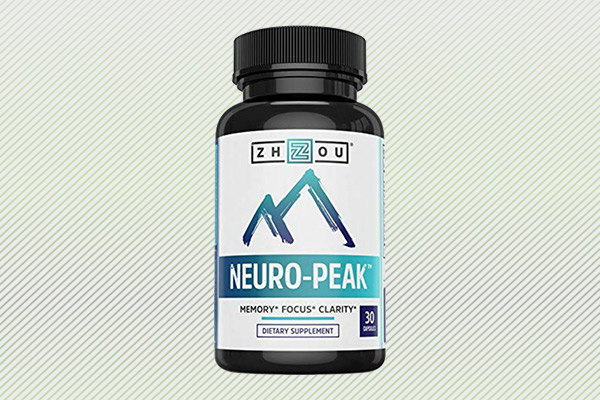
Pros:
- In addition to ginkgo biloba, each capsule contains bacopa, Vitamin B-12, and rhodiola.
- These capsules are non-GMO and manufactured in a Good Manufacturing Practices lab.
- Neuro-Peak Brain Support markets their product as being intended for memory, focus, and clarity.
Cons:
- Each capsule contains only 100mg of ginkgo biloba in comparison to 300mg of bacopa.
- On a per serving basis, this is a bit pricier than some of the other competitors on the market.
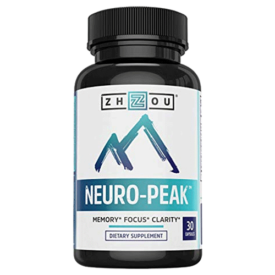
In addition to being a solid source of ginkgo biloba, Neuro-Peak Brain Support includes a nice boost of Vitamin B-12, a popular ingredient in energy supplements. These non-GMO capsules are marketed as being intended to boost memory, focus, and clarity.
Also Consider:
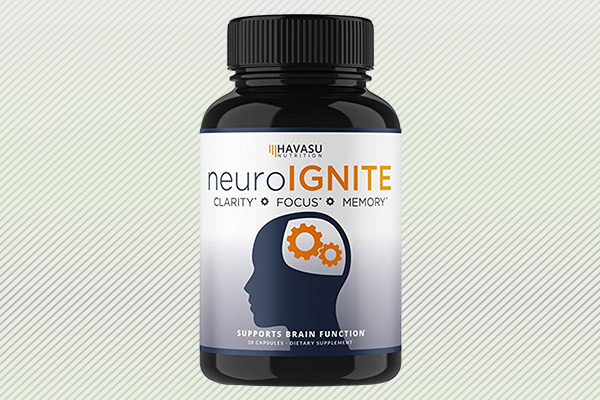
Pros:
- Each capsule contains a blend of bacopa monnieri, ginkgo biloba, and St. John’s wort, along with a few other ingredients intended to treat brain fog.
- Havasu includes a 60 day money back guarantee if you’re not happy with their product.
- These capsules are produced in a Good Manufacturing Practices facility.
- Though these are intended to provide a bit of an energy boost, there’s no caffeine in these supplements.
Cons:
- As the main ingredient in these supplements is bacopa, there’s only 50mg of ginkgo biloba per capsule.
- On a per serving basis, these capsules area bit more expensive than many of the other competitors on the market.
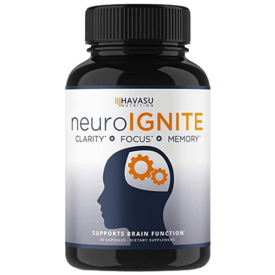
Unique Collection:
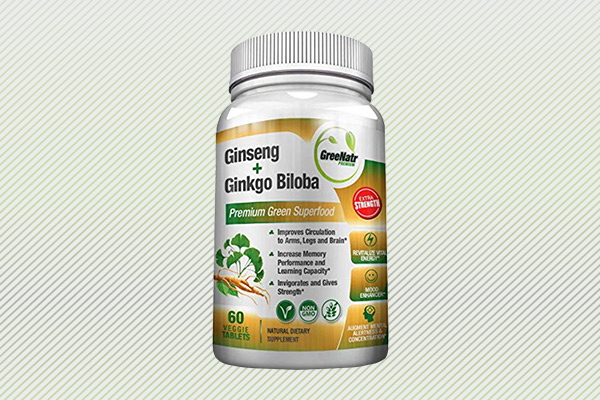
Pros:
- Each tablet contains 300mg of ginseng.
- These supplements come with a 60 day refund policy.
- GMO-free, vegan-friendly, and gluten-free.
Cons:
- These tablets contain 100mg of ginkgo biloba powder, but only 60mg of ginkgo biloba extract.
- The marketing for this product contains a number of pretty outlandish claims about its effectiveness.
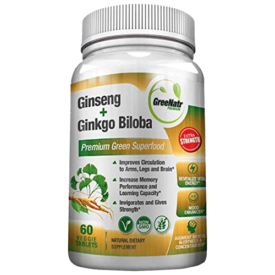
For those looking for a non-caffeine energy booster, you may consider these ginseng and ginkgo biloba tablets. As the name would suggest, each tablet is a combination of ginseng and ginkgo biloba, and intended to be a natural energy source.
Good Value:
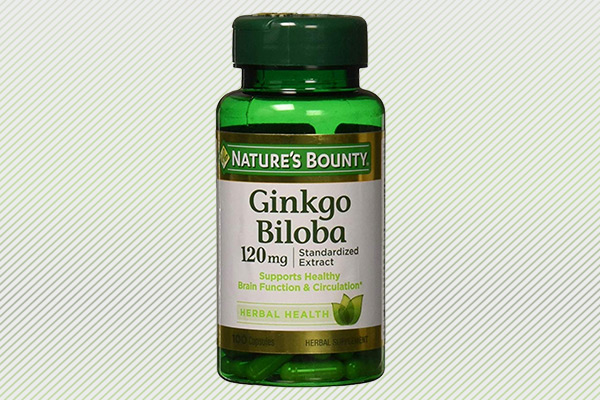
Pros:
- Each capsule contains 120mg of ginkgo biloba.
- These are marketed as being intended to help brain function and circulation.
- Nature’s Bounty touts itself for including rigorous layers of testing for each of their supplements.
- From a cost per serving perspective, these are very competitively priced supplements.
Cons:
- Since gelatin is used in the formulation of these capsules, they are not vegan-friendly.
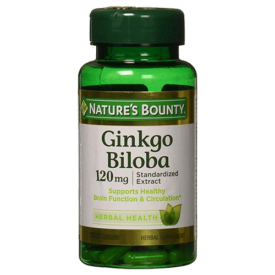
Methodology
Ginkgo Biloba has been used as an herbal supplement in China for centuries. Its popularity has increased in recent decades, as has claims about its effectiveness in treating a number of ailments. While there is evidence that ginkgo’s antioxidative and anti-inflammatory properties may increase blood flow, more research is needed to really determine its efficacy. It’s always wise to consult with a medical professional before adding a supplement to your diet. If you do opt to incorporate ginkgo biloba to your daily regimen, there are a few key features to look for.
Not all ginkgo biloba supplements are created equally. Many companies will tout their use of ginkgo biloba, while adding a number of additional ingredients intended to promote brain health. Take a look at the ingredient list to ensure you know what you’re putting into your body.
Some capsules are made with gelatin, rendering them incompatible with a vegan diet. Take a look at the labeling and verify the supplement fits in with your dietary needs.
Divide the total cost by the number of servings listed to compare the cost per serving of various brands. Be wary of simply looking at the number of capsules or tablets – some supplements will require multiple pills to make up a serving.
BarBend Tips
- It’s always wise to consult with a medical professional before adding a supplement to your diet.
- “Brain fog” has become a popular term in recent years, some folks may benefit from a natural supplement to get an energy boost. However, before turning to a supplement, you may want to see if you can improve your sleep routine.
Ginkgo biloba is a very popular and common herbal supplement, with roots dating back to ancient China. With increased popularity in recent decades, there are a variety of supplements featuring ginkgo as an ingredient.
- Bridi R, Crossetti FP, Steffen VM, Henriques AT. The antioxidant activity of standardized extract of Ginkgo biloba (EGb 761) in rats. Phytotherapy research : PTR. 2001;15(5):449-451.
- Zuo W, Yan F, Zhang B, Li J, Mei D. Advances in the Studies of Ginkgo Biloba Leaves Extract on Aging-Related Diseases. Aging and Disease. 2017;8(6):812.
- Ginkgo. Mayo Clinic. https://www.mayoclinic.org/drugs-supplements-ginkgo/art-20362032. Published 2017.
Click here to view full article